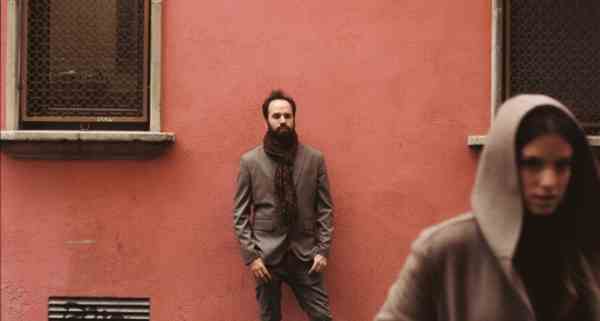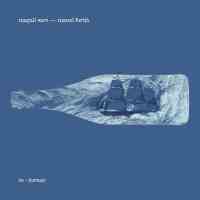

Magalí Sare and Manel Fortià
re · tornar sounds like New York City, with an unexpected lightning fast pace which can slow down and cool off like a Barcelona evening (where they both live). Manel Fortià’s time in New York City influenced his music and perspective. In our e-mail exchange, he said, "Personally, one of the things that surprised me the most when I lived in New York was its multiculturalism and how closely different realities and worlds were found at the same time, that they merged naturally, generating new sounds and identities... I feel that living in NYC changed me tremendously and I grew a lot there." Magalí Sare has acknowledged her passion for Flamenco and tango music. The album opens with "Tornar," Carlos Gardel's well-known tango "Volver" as translated into Catalan. The Cuban Guajira mix adds depth to this rendition.
"Guantanamera," the Jose Marti, Cuban patriot song, gets a muscular bass sound from Fortià for the first 18 seconds before the familiar lyrics with a gender switch for Sare: Soy una mujer sincera Their version accelerates and decreases in speed, skittering between various time signatures. Sare has a wide range that is the perfect pairing with Fortià's bass. We also get Sare playing the flute, along with a chorus and the percussion of David Domínguez. Fortià’s version adds new layers to the song, and the album in general, with humor, theatricality and the ability to keep the listener engaged by being slightly off the expected at all times.
"La meva àvia" ("My grandma"), written by the Cuban poet A.J. Carrau, is about Catalans leaving to fight in the Spanish-American War. It is a song of lament; the narrator’s grandmother and the wife of a sailor was left alone when he went to war in Cuba. Before leaving, her husband said to her, "You will teach your children and your grandchildren four major rules of being a good Catalan. That one should love the language, that one should love the home, that one should love the land, and should love the sea." This song stands as a lullaby, the last cut on the album, and its loveliness soars as a benediction above the rest of the tunes. It has a perfect walking bass line surrounded by percussion that gives it a retro feel, like a ticking clock in a film, with Sare’s voice telling us the sad maritime tale. Fortià describes the album as an exploration of "round trips, cultural fusions and enriching oneself with other languages as music is a universal language that knows no borders." After returning to Barcelona in 2020, he created the Liberica Project. re · tornar is a romantic return to the "stylistic fusions that are found in our imagination, as if history would have generated them naturally." Sare was born in Tarragona, (about an hour from Barcelona), where she began her musical career in her youth. She is a singer, flutist and percussionist both in the classical and jazz genres. The polytimbral quality to her voice adds immensely to the album and her various collaborations with Fortià. The duo has an interesting effect of sounding raw in the way an artist performing a solo can sound on stage; isolated, riveting, focusing the audience on each note. They work so well together that they sound like one. Their music has been described as naked. It would be more accurate to say that the improvising and humorous role playing results in the recording drawing the listener in as if it was a live performance.
The group covers the Portuguese song "Senhora do Almortão" with a bulerías flamenco rhythm from Jerez. It’s a tune from Beira Baixa that is traditionally simply chanting accompanied by the adufe, a percussion instrument traditionally played by women. It tells the story of a lover that has died.
"Mãe Preta" ("Black Mother") describes a female Black slave who cares for a white baby while her own child is getting beaten somewhere else. The Portuguese dictatorship (1932-1974) censored the song by changing the lyrics and the title to "O Barco Negro" ("The Black Boat") with a new story of a woman grieving over her husband lost at sea. The piece has been described as "one melody, two sadnesses." The dictatorship believed the lyrics to be so incendiary that it would cause citizens to rebel against Portugal’s slave society.
"Cambalache" is an Argentine tango written in 1934 by Enrique Santos Discépolo for the movie The Soul of the Accordion. Critical of 20th-Century corruption, it was also banned by a succession of dictatorial governments. Fortià and Sare give this a Bertolt Brecht and later a Tom Waits feel, the music guiding us into an off-kilter, creaky space. The lyrics describe the twentieth century as a display of insolent evil and call out the parvenu in society. Today it happens it is the same
"La Leyenda del Tiempo" (by Federico García Lorca and Ricardo Pachón), is beautifully delivered with percussion, flute work and a bass line that transports us through a song best heard, but can be described as a narrative transition with instruments that has the effect of turning a page. The Sephardic influence adds depth to this tune. Inspired by sea voyages, multiculturalism, humor and political statements, re · tornar is a standout for one of the best of 2023.
Find the artists online.
Search RootsWorld
|

